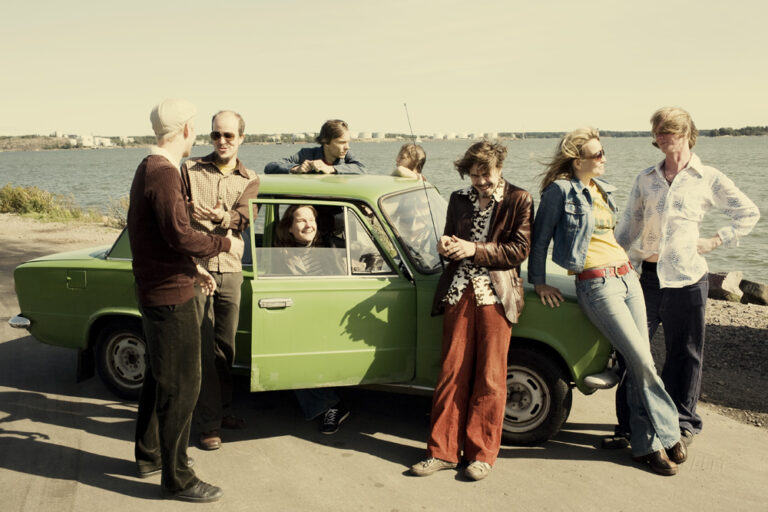Founded in 2001, Maria Gasolina is an 8-piece Helsinki-based orchestra, which performed newly arranged Finnish cover versions of local rhythm and dance music classics and hits from all over the world for a period of 18 years. Their first albums focused mainly in Brazil. One of their original purposes was to introduce and popularise songs outside the Anglo-American music culture to the Finnish audience. They are even better known of their ecstatic live energy, which made them the definite sure shot of the local scene to fill up the dance floor every time they performed. The sold out farewell show at Korjaamo Culture Factory in Helsinki in 2019 lasted for three hours, and the band released the live album Jäähyväiset, based on the material of it, as their last official effort.
The songs of Maria Gasolina are based on original tracks from psychedelic samba rock all the way to Somalian funk and Arabic folk. Instead of doing mimic covers there has always been room in their music for originality in the arrangements, which gained them a legendary reputation among the local rhythm music fans and followers through the years and made them one of the essential lineups and best party bands in the Finnish scene. Other characteristics of their music have been multi-layered rhythm patterns, strong emphasis on the horn section as well as the lively and often larky style of how singer Lissu Lehtimaja performs.
The spearhead of the 8-piece group, vocalist and trumpetist Lissu Lehtimaja speaks and knows for example Portuguese fluently and has always put a lot of effort into the background work of translating the song lyrics without losing the original sense and spirit. And if it was not clear enough, she spent even more time to get into it. Lehtimaja studied as an exchange student in Brazil when she was young and got excited of especially the 60’s psychedelic Tropicália movement while living there. This has formed the basis for Maria Gasolina’s music, which has thus drawn inspiration and explored sound from other parts of the world. The name of the band refers to girls or women, who are interested in dating men because of their cars (and the social status is brings).
More than a dozen of different musicians have played in the lineup through the years. The head of the rhythm section, drummer Mikko Neimo, has been supported by percussionists Janne Auvinen (Echosystem, Miss Saana & The Missionaries), Aarne Riikonen (Auteur Jazz, Rhythm Funk Masters, Tuure Kilpeläinen & Kaihon Karavaani) and Patrick Nwajei. The horn section was based on the talents of Taneli Bruun on tenor saxophone and Essi Pelkonen on alto saxophone. Bass was originally played by Ilppo Lukkarinen, who handed the role later on to Matti Pekonen, while guitarist Timo Wright was similarly later replaced by Kalle Jokinen. Flutist and background singer Sanni Verkasalo and keyboard players Mikko Ojanen have also had undisputed roles across the lifespan of Maria Gasolina.
Maria Gasolina released five albums altogether with the debut effort Se jokin published in 2006 and followed by another Brazilian-themed Mä olen sun in 2008. On Aina uusi aalto, released two years later, the band arranged Finnish versions of songs from for example Haiti, Madagascar, Iran and the Nigerian afrobeat legend Femi Kuti (“Beng Beng Beng”). Selected tracks from these years can be heard on their compilation album Koko kaupunki on jees released as a double vinyl. In 2014 the band made one of their long-term dreams come true by touring with rapper Paleface for two weeks in three cities in Brazil and performing there live eight times altogether for the local audience.
The fourth and last studio album Pitkää siltaa was issued in 2017. On this one the band moved musically to even wider all over the world focusing especially in Middle-East and Africa as well as working together with several immigrant musicians. In terms of quality, excellent album wasn’t an exception to the previous ones. Instead the band finished their career eclectically in style in the heart of the local funky scene after spending the first two decades of 2000’s there and reaching 18 years of age. Maria Gasolina has also proved how great and creative a cover band, always downplayed by some for that, can be: an open window to new and previously unknown music cultures with a local perspective.
Text: Joonas Kervinen / Funky Finland

